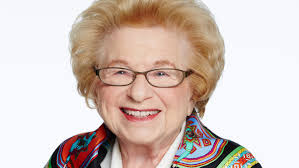
NEW HAVEN — Dr. Ruth Westheimer shared her experience as part of the Holocaust’s Kindertransport at “Orphans of the Holocaust,” the opening event of the Yom Hashoah-HolocaustRemembrance Day commemoration at Yale University’s Joseph Slifka Center for Jewish Life. Westheimer is co-teaching a course on “The Family and the Jewish Tradition” at Yale this semester with the university’s Jewish chaplain, Rabbi James Ponet.
Dr. Ruth Westheimer was born in 1928 in Frankfurt, an only child in a lower middle class Orthodox family. When her father was taken by the Nazis, her mother and grandmother thought it would be safest for her to be evacuated from Germany.
“They closed the Samson Raphael Hirsch Orthodox school, and I was told I had to join a group of children going to Switzerland or my father couldn’t return.” Wertheimer boarded the kindertransport to Heiden, Switzerland on Jan. 5, 1939. She waved to her mother for what would be the last time.
In Switzerland, Westheimer, then only ten years old, lived in a children’s home overlooking Lake Constance. “We could see Germany,” she recalls. She was enrolled in vocational training, where she learned to care for Swiss children (bathing them, doing their laundry and cleaning their toilets). Westheimer wasn’t permitted to attend school, though she had dreamed of studying medicine. She communicated with her parents and hoped she would see them again. The letters stopped suddenly in September of 1941; she later learned that her parents had been taken to the Lodz Ghetto, where her father was a cemetery gardener, and most likely killed in Auschwitz.
At the conclusion of the war, Westheimer was 17 years old. She decided to go to Palestine, where she lived on a kibbutz picking olives and tomatoes. She also served in the Haganah, a precursor to the Israel Defense Forces, where she became a sharpshooter. She was badly injured on her twentieth birthday, while doing guard duty; an Arab shell exploded at her feet. Luckily, she recovered and was able to walk.
Westheimer moved to France in 1950. Eventually, she resettled in New York, and received a doctorate in education from Teachers College of Columbia University. Affectionately known as “Dr. Ruth,” Westheimer is best known for her radio program, “Sexually Speaking,” which began in Sept. 1980. Westheimer spoke movingly of her parents and grandparents and of the importance of early childhood socialization. She spoke of how the orphans “created a community to have a family again,” and of how “many boys and girls went in to the helping professions.”
Sharing the stage with Westheimer at the Holocaust commemoration was a local Kindertransport survivor, Irm (Irmgard) Wessel. A social worker, Wessel is a long-time resident of New Haven and a member of Congregation B’nai Jacob in Woodbridge. During the war, she was sent to England from her home in Kassel, Germany. Unlike Westheimer, Wessel was eventually reunited with her parents in America.
Describing her family as “German first and Jewish second,” Wessel said her businessman father, the vice president of a steel factory, held positions of importance in the synagogue and in the Jewish community. His position of importance, and his role as a mediator between the Jews and the Nazis would prove useful in getting Irm on the Kindertransport to England.
The audience listened intently as Wessel shared the details of her story, including the actual date of Krystallnacht. While most histories report Krystallnacht to have taken place in Germany on Nov. 9 and 10, Wessel notes, “The Nazis practiced in Kassel on Nov. 7, 1938.”
Kessel also spoke about being forced to add the name “Sarah” to her name (all girls were forced to add “Sarah” and males, “Israel”), seeing her father cry for the first time, the train ride to England, and life in her English foster home.
Upon arriving in New York at age 14, Kessel was forced to throw her stamp collection overboard as she was told she could not enter the U.S. with “anything of value.” Following her reunification with her parents and resettling in Iowa and later Illinois (partially assisted by the American Friends/Quakers), Wessel eventually settled in Connecticut where she is a member of the therapeutic community, and an activist.
